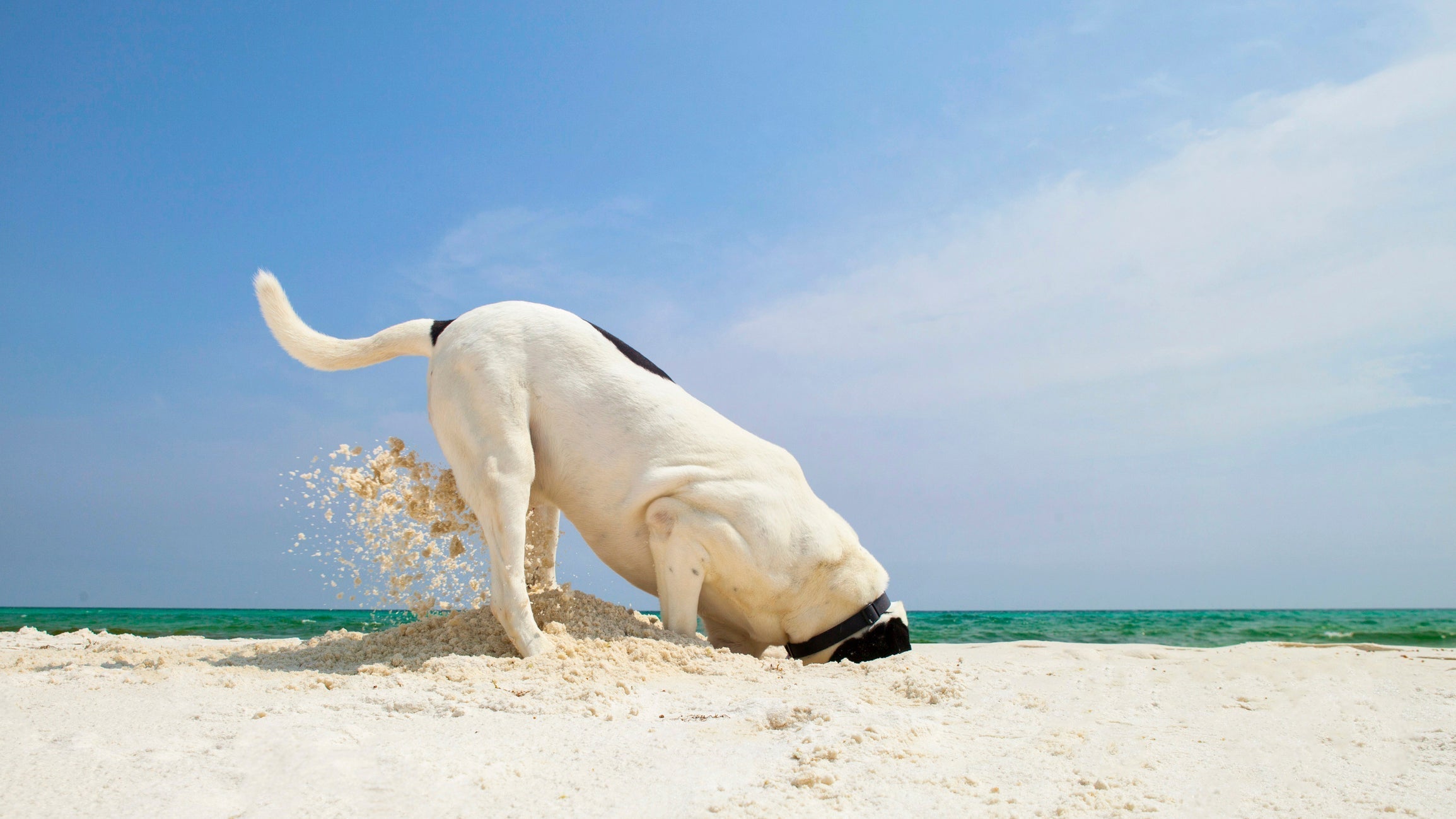Natural Instincts and Ancestral Behaviors
Why do dog dig in their beds?
A prime example is when dogs dig in homes and this is because their natural instincts are still intact as compared to those of humans. Their ancestors who were wild canines would dig dens for protection against predators and harsh weather. They also buried food to hide it from scavengers and mask their scent from potential threats. In many ways, pets never lose the traits of a wolf such as digging around in backyards or gardens. Owners need to recognize these natural instincts and provide appropriate outlets that satisfy their needs to avoid further damage.
Comfort and Nesting Instincts
In terms of a sleep area for a dog, there are inherent nesting tendencies that manifest through behavior around this space. For dogs, fertile ground should be well made since they always seek out snug places where they can fall asleep properly; hence, comfortable sleeping areas must be made available for them. This may involve digging holes so that they can regulate their body temperature effectively at all times. By way of digging then dogs will cool down by exposing cooler ground or in cold weather they have warmer nests. Besides fluffing up the bedding or ground, some dogs may dig into their bed so as to soften it making it more comfortable. When the sleep environment provided recognizes these urges, dogs will rest better improving their general welfare.
Marking Territory and Scenting
Why do dogs dig at their beds? Marking territory as well as scenting is a basic dog behavior. It’s in their nature for dogs to mark their beds and when they do that, it makes the dog feel like his/her bed belongs to him/her. For eons this has been a legacy stemming from their ancient desire to own lands and keep unwanted guests away. Dogs’ olfaction uses odours as an important tool of communication, hence its role in dog behaviour is crucial. This involves getting up on their hind legs and moving them back and forth over the bedding with the front paws, which drags along some of their smell from various parts of the body including scrotal sacs. In addition, by digging at bedding materials with claws they reinforce themselves among other creatures for comfort sake.
Stress and Anxiety Relief
Why do dogs dig in bed? Dogs may dig because they are anxious. Sometimes dogs will dig when nervous to release anxiety or simply burn off nervous energy much in the way people might shake a leg or tap a pencil end on a desk top. Additionally, if there isn’t enough mental stimulation or physical exercise the boredom levels can result in bed digging where dogs can start scratching due to frustration or divert themselves through doing that action. Stress-related digging demands increased movement of bodies, engaging animals’ brains more often and providing such surroundings that bring relaxation to them. The provision of playthings, interactive games and secure, snugly sleeping spaces can all help reduce anxiety or boredom associated with stress induced diggings.

Health and Physical Factors
Why do dogs dig on beds and couches? Digging behavior among dogs is affected considerably by health conditions and physical factors that are related to it. Dogs may dig because they want to get a better or more comfortable place to lie or even reduce any discomforts that may be experienced due to the existence of underlying physical problems such as arthritis, joint pain or skin ailments. Similarly, some dogs will increase the number of times they dig into soil whenever they have fleas, allergies and other skin irritations in order to lessen itching and irritation. There are moments when it’s important to see a vet about excessive digging by your dog especially if accompanied by signs of discomfort. The diagnosis of an ailment in a dog could then be identified and measures prescribed with regards the environment where it stays so that life for these animals can become comfortable again.
Breed-Specific Tendencies
Different breeds have different inherent characteristics that make them prone towards digging behavior. Terriers, Dachshunds and Beagles are some examples of breeds that have strong natural instinct for digging since they were originally bred as hunting dogs meant for burrowing animals. Recognizing these breed-specific needs is crucial for managing and mitigating digging behaviors. To satisfy their urge to dig inside the ground, dog owners should provide suitable areas for this purpose; interactive toys; or take them through agility training among other things like giving enough mental stimulation besides ensuring these breeds do not lack physical exercise.

Environmental Influences
A dog’s digging habits are greatly influenced by environmental influences. Comfort and digging behaviors of a dog can be affected by the kind of material that is used as bedding, for example, if bedding is extremely soft or doesn’t keep heat properly dogs will dig more. Environment, including temperature, noise level and presence of other animals can also affect digging behavior. Reducing digging involves choosing strong and comfortable bedding mats; providing calm sleeping areas and appropriately positioning them in secure places.
Training and Behavioral Interventions
Lessons on how to prevent a dog from digging are done through training and behavior modification may include where members learn the “no-dig” command followed by a reward whenever the dog obeys it. It is possible to redirect this behavior easily by providing alternative outlets for dogs especially specific areas created for him to dig or even toys. In this way, desirable behaviors can be encouraged such as offering treats when the pet does not exhibit digging actions in inappropriate areas or praising it. The key to minimizing unwanted excavation behaviours while maintaining a positive and rewarding environment for your pet is ensuring constant training with patience.
Digging and Play Behavior
Often, digging and playing are so closely related that it is important to differentiate between playful digging and other types of play. It is usually accompanied by an exuberant mood, a wagging tail and general excitement. By building safe, designated digging spots in the yard or giving dogs toys that encourage them to dig, you can include digging during playtime. In this way, dogs can express their instincts for digging but in a controlled manner thus preventing them from targeting places they should not be digging at and promoting healthy involvement.
Addressing Destructive Digging
When we talk about destructive rooting, there are indicators such as continuous excessive digging on gardens, furniture or floors that signal this behavior. Techniques that effectively discourage destructive behaviors involve engaging pets through exercising with interactive toys and other items; creating special areas where dogs can dig; and using taste aversion sprays (which are harmless) amongst others. Nonetheless, if these strategies prove ineffective; one may opt to consult qualified trainers or animal psychologists who will deal with the root causes of the situation and then come up with a personalized plan that helps manage or redirect the canine’s damaging conduct proficiently.
Enhancing Your Dog’s Bed Experience
Making your dog bed better requires thinking about when choosing one and its arrangement so as to minimize the urge to dig while maximizing comfort. When selecting a bed for your dog, look for one that suits its size and sleep habits. Moreover, this selection should have materials that are resistant to digging behavior. Besides, you can add soft blankets or orthopedic inserts to the bed for extra comfort. You can also place the bed in a quiet area where it is shielded from noise and disturbance so as to promote relaxation. Lastly, provide play activities and mental exercises which will reduce stress caused by passive behaviors that dogs engage in when they are bored.
Summary
Helping dogs with their digging issues requires an understanding of what causes them to dig and how to deal with it effectively. Dogs dig due to several reasons such as anxiety relief, boredom or comfort-seeking behavior or even territorial marking. Providing designated digging areas or interactive toys is another way of meeting these needs. The choice of bedding and environment can limit undesired trenching too. On top of using positive reinforcement in training dogs not to dig inappropriately, redirections may be effective measures for reducing destructive digging actions. To make sure that a dog does not frequently dig too much into its owner’s property; the human being must comprehend the dog’s own drives and what it needs.
Buy playpens for your fur buddy, you can check out more on our store
FAQ
Is digging in beds normal behavior for all dogs?
Some dogs, particularly those with strong nesting or territorial instincts, might indulge innocently in bed digging. This is often an offshoot of natural behaviour such as making a comfortable sleeping place for oneself or marking one’s territory with scent. However, there could be underlying causes of this excessive or destructive digging.
How can I tell if my dog's digging is due to anxiety?
Determine if your dog digs out of anxiety by noting traits like excessive digging, pacing, restless behavior and destruction when it is alone. Advice from a veterinarian or animal behaviourist can reveal the root causes and effective management options.
What are some quick fixes to prevent bed digging?
Quick ways to stop your pet from bed digging may involve providing alternatives for Digging e.g loose soil or sand on the designated areas where dogs are allowed to dig; Using things like double sided tapes or aluminium foils on the bed that repels them; Making sure that there are enough physical and mental exercises among the dogs; And using puzzle toys as calming aids and other comforting scents.
Are there specific bed types that discourage digging?
Yes, some types of beds can discourage dogs from digging into them. Beds made with sturdy frames or raised designs that prevent access to the bedding material can discourage digging. Moreover, memory foam beds, as well as fitted covers, could be included in these types of beds so as to limit the temptation to dig. To help dogs stop digging, they need to be provided with nest beds with their covers.
Can digging behavior be completely eliminated?
However, dog digging can still be controlled and lessened but it cannot be done completely away with. The cause of such a behavior which may include boredom, anxiety or even the natural instinct should be addressed whereby alternative activities that could capture the dogs’ attention are given like demarcated areas for digging and interactive toys. This is also an acquired behaviour that is encouraged by consistent training through positive motivation while building up a stimulating environment. All the same, some dogs will dig from time to time because of their instinctive tendencies or when provoked.


Share:
The Ultimate Guide to Choosing the Perfect Dog Bed for Every Breed
How to Train Your Dog to Use an Elevated Bed Without Chewing It